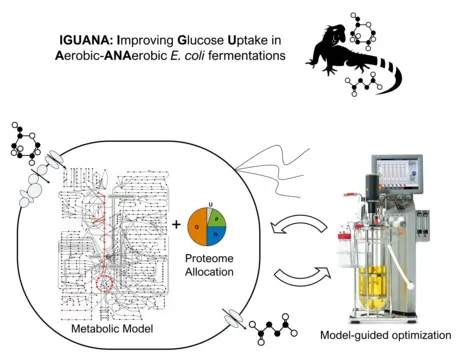IGUANA: A systems biotechnology approach for improving substrate uptake during succinic acid production in a two-phase cultivation process.
Succinate has been identified as a key chemical building block for transitioning to a bio-based economy; however, its microbial production is still largely not competitive with the petrol-based process. To improve its production by fermentation, one option is to use a two-phase process; with a first aerobic growth phase, followed by a second anaerobic production phase. Such two-phase fermentations can theoretically reach much higher productivities than one-phase fermentations by uncoupling microbial growth from production; thus reducing resource competition for biomass production in the second phase. However, one central problem with two-phase fermentations is that the substrate uptake rate of the cell typically collapses under real-world, slow-growth conditions, so that the volumetric productivity is not actually increased compared to a one-phase process without further engineering.
Thus, the main objective of this project is to increase the substrate uptake rate of Escherichia coli in the anaerobic production phase of the process. We focus on understanding why and how the limitation of the substrate uptake rate arises. Ideally, this will illuminate a pathway towards engineering E. coli for two-phase fermentation processes. In the best case, these results could also be eventually generalized for other industrially relevant bacteria.
In order to achieve that, our approach focuses heavily on in silico modelling and engineering of E. coli. Central to the approach is the use of state-of-the-art genome-scale, resource-constrained metabolic models. Such models have been successfully used in the last few years to better simulate the observed metabolism of microorganisms in bioreactors. This project is being developed in conjunction with the Max Planck Institute for Dynamics of Complex Technical Systems in Magdeburg. They focus on the experimental work, while we focus exclusively on the in silico section of the project.
Project supervisor: M.Sc. José García Lima
Start of the project: 01.07.2022
